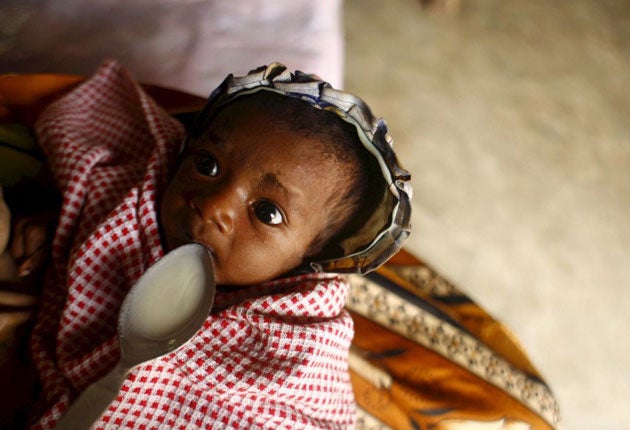World leaders warned that approach to African aid needs a total rethink
As key summit on Millennium Development Goals begins, experts cast doubt on conventional approach to poverty reduction

As world leaders gather in New York today to decide the future of aid, an influential new lobby has emerged calling for a total rethink of foreign assistance. At the end of a decade dominated by slogans such as "Make Poverty History", in which development has been defined by a series of sweeping targets – known as the Millennium Development Goals (MDGs) – experts are warning heads of state at the global poverty summit not to sign up blindly to more of the same.
A draft declaration being circulated by the UN deplores the lack of progress and calls for "redoubling of efforts" towards 2015 targets such as slashing poverty and improving access to education. International NGOs concerned at "aid fatigue" are demanding a "rescue package" to save the goals.
But a third way is being called for by some experts, who warn that ignoring the shortcomings of the past 10 years in favour of staying the course risks destroying public faith in aid. "While laudable and important aspirations, the targets are actually the wrong measures of development progress," says Phil Vernon from International Alert, a London-based group calling for a radical rethink of aid. "It is not just the MDGs which are at fault. Despite some brilliant thinking and actions within the development sector, the prevailing paradigm has become tired, confused and is in need of renewal."
The summit marks the 10th anniversary of the Millennium declaration, signed by 189 countries, which set out eight specific targets aimed at making a better world by ending extreme poverty. Some progress has been made, but it is clear those targets will not be met.
The architect of the MDGs, US economist Jeff Sachs, says the blame for the anti-poverty project being off-track lies in western capitals. "Rich countries made promises which they didn't follow through on and now people want to say it was wrong all along," Professor Sachs says. The UN estimates the gap between funds promised and those delivered is worth $20bn (£12.8bn) for this year alone, with $16bn of that affecting the poorest continent, Africa.
The G8 grouping of wealthier economies committed themselves to spend 0.7 percent of GDP on overseas development assistance (ODA) but are lagging behind on 0.34 percent. Professor Sachs says the targets remain "realistic and practical" if rich countries would spend less on their military and more on development.
But leading aid sceptic Professor Bill Easterly says the goals were a successful fundraising exercise which then squandered much of the money meant for the poorer world. "Why waste any more efforts on the MDGs?" Professor Easterly asked recently. "[They] will go down in history as a success in global consciousness-raising, but a failure in using that consciousness for its stated objectives."
Paul Collier, author of The Bottom Billion and professor of economics at Oxford University, says both left- and right-wingers have exaggerated the importance of aid. "Aid is not transformational by itself in either a good or a bad way. It's not that if only we had a lot more aid we'd transform Africa." The age of slogans such as "End Poverty Now" is over, he says. "We have moved beyond that and we have got to recognise complexity."
The Overseas Development Institute, the UK's leading think-tank on aid, says that the millennium goals should be judged on relative progress, rather than absolute failure. " The problem with the MDGs was that they were agreed as ends but then confused with means," says the ODI's Claire Melamed. "They were a political bargain, not a blueprint for development but that's how they have been misused."
Despite concerns over international strategy, senior UN officials and anti-poverty campaigners will put the EU delegation under severe pressure to make good its funding promises and take moral leadership of the aid project. There is a broad understanding of the failings of efforts so far but many governments and aid agencies would rather "hold their nose", as one official put it, and get to the end of the target period rather than risk a rethink now.
But the consensus that the MDGs are the only show in town is being questioned, with some analysts suggesting that this approach could hurt any remaining public trust in the aid industry.
While the West's broken promises are coming across loudest, there are voices calling for better-quality aid, and the need for non-aid approaches, including reducing trade barriers, International Alert said in a pre-summit report. "There is no simple correlation between the volume of aid and its impact," Mr Vernon says. "Failing to meet the goals should not be interpreted to mean we should spend more money in the same way. People were told a story in which if they opened their chequebooks they would end poverty. But ending poverty is as much about politics as about getting children into school."
Unless a more honest story is told, which admits that the targets set 10 years ago were too narrow, it is argued, there could be a huge backlash from people who feel misled. A failure to get this right now could mean that instead of ending extreme poverty, present efforts destroy the compact between taxpayers in the rich world and the development community and make aid history.
Join our commenting forum
Join thought-provoking conversations, follow other Independent readers and see their replies
Comments